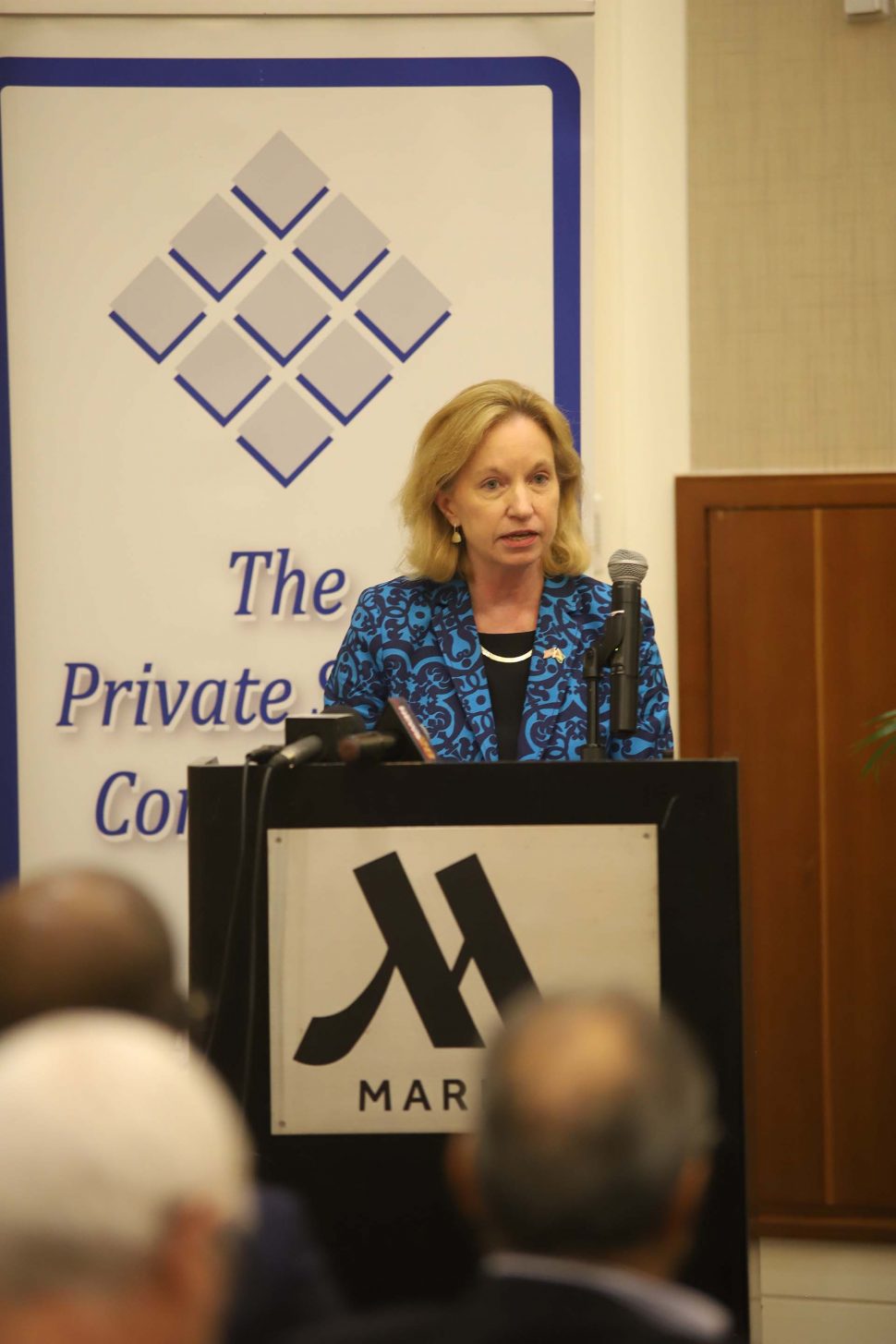United States Ambassador Sarah-Ann Lynch yesterday restated that the private sector has a part to play in ensuring that oil revenues are used in a transparent and sustainable way and she also warned that challenges to the business climate have to be addressed.
“Over the last three years, the US Embassy has experienced a steady increase of inquiries from companies at various stages of the foreign investment process who are interested in working in Guyana. These companies are not just in the oil and gas sectors. We see interest from companies working in engineering, healthcare, telecommunications, infrastructure, air transportation, and information technology, just to name a few. Guyana has burst onto the world stage and is no longer the hemisphere’s best kept secret,” she told yesterday’s Annual General Meeting of the Private Sector Commission (PSC).
“Some of you have heard me say, promoting responsible and sustainable economic growth is one of my top priorities as Ambassador. Oil production will begin in a few short months, so the growth part will take place regardless, Ensuring responsibility and sustainability, though, will require effort on everyone’s part,” she added. This was a message she had stated on Tuesday at a Guyana Manufacturing and Services Association luncheon.
But the US envoy also noted limitations to doing business here, even as she urged the PSC to act on pressing for changes to ensure the ease of doing business quickens.
“While Guyana’s business climate is good with even greater prospects for the future, it is not without its challenges. The World Bank’s 2018 report on Ease of Doing Business reflected a drop in ranking from #126 in 2017 to #134 in 2018, out of 190 countries. Places like Iran and the West Bank and Gaza ranked better than Guyana. Some of the contributing issues highlighted in the report include taxation, energy, and infrastructure, intellectual property rights (IPR), bureaucracy, and lack of transparency, corruption, and citizen security. Guyana’s complex tax structure often leads to companies paying higher tax rates than they would in other countries. In addition, the duties imposed on many imported items can be substantial, driving costs up beyond competitiveness… Other infrastructure gaps include lack of a transnational road network and a deep-water port, which, if addressed, would decrease the time and cost of transporting goods,” Lynch said.
“As with many governments around the world, the bureaucracy could benefit from streamlining and modernisation. Acquiring permits and buying land requires patience, and several government agencies still rely on paper. Obtaining proper visas or work permits in a timely manner is becoming a growing concern for foreign companies and organisations – your future potential business partners. Corruption continues to be a perennial concern, but Guyana has made significant strides on this front and I’m sure it will continue to do so. Changes to the financial sector, combined with the creation of the Financial Intelligence Unit, resulted in the IMF officially removing Guyana from the European Commission’s list of countries deemed deficient in anti-laundering frameworks in February. Intellectual Property Rights legislation needs updating to match advancements in technology,” she added.
‘Strategically positioned’
These issues raised, she said, were not to scare away investment, but to show that each one can be resolved over time and with the proper resources and with input from the PSC, which could among other things, push for their members to pay their fair share of taxes.
“With oil production starting in a few short months, and with the Natural Resource Fund (NRF) in place to properly channel oil profits, Guyana should be able to invest more resources in its future. Here is where the PSC can help the process along. The PSC is strategically positioned to offer the guidance needed to shape the legislation needed to move Guyana forward. The PSC sub-committees can utilise their expertise by reviewing policies put forth by the government and recommending constructive changes. By doing so, the PSC can play an integral role in shaping a wide range of legislation,” Lynch said.
“The PSC can also serve as an example of transparency and ethical behaviour to the rest of the business community. Internally, it can encourage all its member-companies to pay taxes in a timely manner and as prescribed by law, so that GRA can collect more revenues, hire more staff, and provide additional training to better handle the upcoming oil. The PSC holds a seat on the Macroeconomic and Public Accountability and Oversight Committees for the NRF, allowing them to help shape how oil revenues are spent. The PSC can also provide valuable assistance in ensuring that future tax reform delivers enough revenue to GRA, but is not a burden to economic growth. Duties and taxes can be adjusted to create a more globally competitive environment. Initially these changes may appear painful, but all growth comes with a measure of pain. As businesses grow, so will the revenue generated by taxes,” she added.






